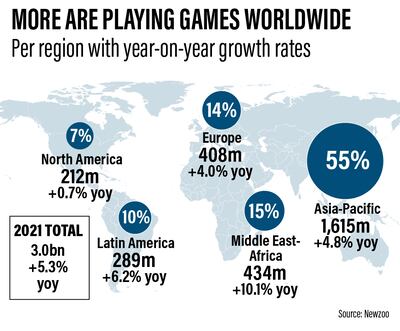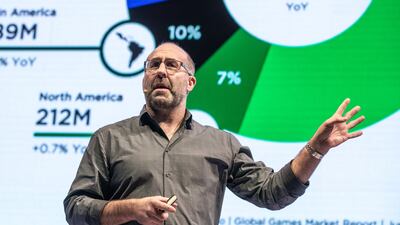Venture capital funds are mostly staying away from investing in the gaming industry and missing out on multi-billion-dollar opportunities because the lack of understanding of the sector's dynamics, a former executive director of the International Game Developers Association said.
Jason Della Rocca, a gaming entrepreneur and former advisory board member of Global Affairs Canada's ICT practice, said that in recent years, the creative market for games had been bigger than film and music combined, having expanded in each of the past 25 years and grown in double digits during the Covid-19 pandemic.
The top 15 venture capital funds dedicated to gaming have almost $2.5 billion in assets under management, according to advisory firm Games One, with New York-based Galaxy Interactive accounting for $585 million.
The gaming business existed without dedicated venture capital for the first 38 years, but when game venture began, it raised $1.5bn in its first decade, it said.
“A lot of traditional investors don't touch games because they don't understand the economics and they stay away from it,” Mr Della Rocca told The National.
“If you're pitching to a more generalist fund, like those in FinTech and software-as-a-service, it's harder because they don't understand the dynamics and they don't know how to evaluate whether you have a chance to succeed or not.”
The global gaming market's rise mirrors the increasing demand for content as more users put in more playtime. There are over three billion players globally, Newzoo data reveals. The industry will grow at a compound annual rate of 8.7 per cent from 2019 to 2024, with its value expected to hit $218.8bn in 2024, a 21 per cent rise over 2021's $180.3bn, it added.
The Asia-Pacific region accounts for a huge chunk, with 55 per cent, or 1.62 million, of the total market, Newzoo said. The Middle East and Africa is a distant second with 15 per cent, or 434 million, followed by Europe (408 million), Latin America (289 million) and North America (212 million).

The mobile segment accounts for a significant share of the overall gaming software industry. The market for global mobile gaming content was valued at $121.1bn and is expected to grow 40 per cent to hit $169.7bn by 2025, data from Statista shows. Asia generates the most revenue in the segment.
Smartphone gaming is the top segment, with revenue expected to hit $79bn this year, Statista added. Console games – the likes of Sony's PlayStation and Microsoft's Xbox – are poised to record $49.2bn.
To thrive in the gaming industry, both developers and investors need to understand that games are a “rich mix” of art and culture, and technology and business, Mr Della Rocca said.
“If you don't understand the artistic and cultural side, at the end of the day you're just producing an entertainment product, and there are certain hit-driven dynamics to the economics of it,” he added.
Gaming is among the sectors that will help advance the UAE's recently-announced National Strategy for the Creative and Cultural Industries, a first in the Arab world that aims to make these sectors among the Emirates' top 10 economic contributors.
Abu Dhabi is pressing ahead in developing a world-class gaming ecosystem. On Monday, Mubadala Investment Company and Abu Dhabi Gaming signed a preliminary agreement to develop an eSports ecosystem to attract global talent and boost the local creative industry.
Mr Della Rocca acknowledged the UAE's huge efforts, but pointed out that a lot still needed to be done, especially when it comes to content.
“The UAE is making attempts – particularly from Abu Dhabi, twofour54 and Abu Dhabi Gaming – and it's encouraging to see the initiatives being done, but it's still a long way to go,” he added.
“GCC gaming consumption and spending is high and lot of people here play games, representing a large market, but in terms of content creation there hasn't been too much activity.”
For smaller developers, market discoverability and audience development can bridge the gap between them and bigger companies. But the viability of a product being pitched will also be critical to convince venture capitalists to fund them.
gaming entrepreneur and funding advisor
The model of Fortnite and Angry Birds, free-to-play titles that have no end, is an example that developers can emulate. It has exponential scalability, and its dynamics, working in a way that gives returns investors seek, are appealing.
“If you're doing a more traditional game like a consumable product, they'll tell you it's too risky. Part of the responsibility of the developer is to understand what kind of game and business model they have and whether or not it's even suitable to go talk to a venture capital fund,” Mr Della Rocca said.
“If you have a premium price paid game then don't even waste your time.”
Gaming can also serve as a key economic driver. In Canada, the government recognises games as a priority sector, with 40,000 direct jobs, $3bn in gross added value and a highly-paid, knowledge economy workforce, Mr Della Rocca said.


